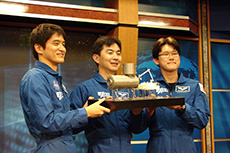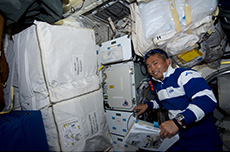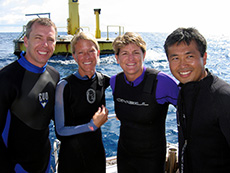Q. What are your future expectations for Japan’s astronauts?
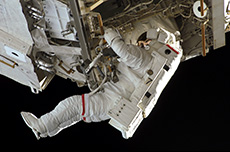
Soichi Noguchi conducting a spacewalk (courtesy: NASA)
I expect them to play leadership roles. Looking at the Japanese astronauts who have been through NOLS and NEEMO, they really value harmony with everyone on the team. I think Japanese people are particularly good at adapting to being team members, but now I’d like us to hold on to that spirit of harmony while actually shaping the team. Of course my greatest aspiration for our astronauts is for them to become commanders.
Japanese astronauts have become so good that one of them now teaches other astronauts to operate robotic equipment, but I also want them to be active in spacewalks. Takao Doi and Soichi Noguchi have gone on spacewalks during shuttle missions, but we haven’t had a chance to do one on the ISS. It’s a taxing activity, so a large body is certainly an advantage, but I’d like people to start letting Japanese astronauts handle spacewalks to perform the sort of precision work requiring dexterity that we excel at.
Going forward I’d like Japanese astronauts to move up from just riding on other countries’ spacecraft to actually operating a spacecraft themselves. The United States and Russia only let their own astronauts control their vehicles, so I think that somehow Japan needs its own spacecraft so that we can produce Japanese pilots.
Q. Do you want to see Japan build its own spacecraft?
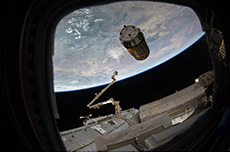
KOUNOTORI 2, 10 meters below the ISS on its approach to the space station (courtesy: JAXA/NASA)
Yes, I definitely do. Japan has succeeded in transporting cargo to the ISS with KOUNOTORI, and we are now researching how to make this spacecraft retrievable on the ground. If we can develop this technology, then a manned spacecraft will no longer be a mere dream for us. If we can get our own manned spacecraft, then we can show the entire world how great Japanese technology is, and also use that technology to strengthen our domestic technology infrastructure.
But making a manned spacecraft requires an enormous amount of money and personnel, so I believe we need to make a greater effort to explain the benefits and win the support of the Japanese people. Also, the United States and Russia lost astronauts’ lives in the process of developing their manned spacecraft. If Japan is to develop one too, then we can’t rule out the possibility of deadly accidents. That’s why I think that we of course have to make a determined effort to maintain safety, as well as being ready with a response if an accident does occur.
Q. Give us your outlook for Japan’s manned space program.
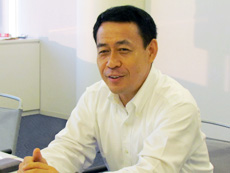
I want to train more astronauts who are trusted by their colleagues around the world. JAXA has its own methodology for selecting and training astronauts. Since all the astronauts that we have trained so far have been praised by other countries for their excellence, I personally would like to help select and train astronauts from other Asian countries, should they ask us to.
Right now astronaut Satoshi Furukawa is on the ISS conducting a variety of experiments in space. His six-month stay ends on November 22. About six months later, Akihiko Hoshide will begin a six-month stay on the ISS, followed by Koichi Wakata near the end of 2013, who will be the first Japanese commander. Also, last July, Kimiya Yui, Takuya Onishi and Norishige Kanai were certified as ISS astronauts. I expect Japanese astronauts to be active in more and more areas.
Manager, Human Space Technology and Astronauts Department, Human Space Systems and Utilization Mission Directorate, JAXA
Dr. Yamaguchi has a Ph.D. in psychology. He joined the Japan Aerospace Exploration Agency (then known as the National Space Development Agency of Japan) in 1987, and has worked on the International Space Station program ever since, contributing to the development and operation of Kibo, the Japanese Experiment Module, as well as other duties, such as astronaut training. His specialties are ergonomics and psychology. He has been in his current position since 2006.
Kibo: The Focal Point of Japan’s Manned Space Program
Leadership Expectations for Japanese Astronauts
The Space Shuttle helped me grow as an astronaut
Trajectory of Shuttle Missions with Japanese Crew Members
